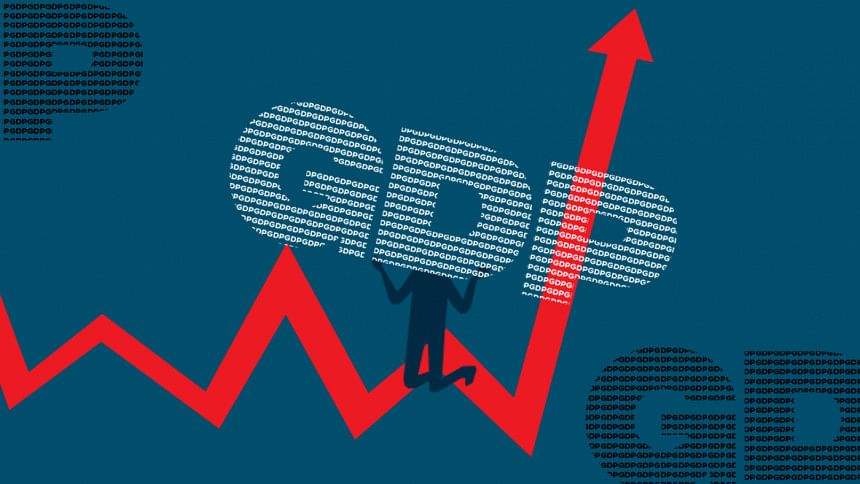Growth, revenue targets too lofty

Economists said the government would not be able to achieve the target of revenue mobilisation and economic growth this fiscal year.
"The target for growth and revenue collection is sky-high and unrealistic," said Ahsan H Mansur, executive director of the Police Research Institute (PRI) of Bangladesh.
The projected GDP growth of 8.2 percent is highly unrealistic and there are potential dangers in taking such an approach, said Rizwanul Islam, a former special adviser for employment sector at the International Labour Office, Geneva.
"First of all, it can result in practical problems in managing the economy. With such unrealistic projection of output growth, estimates of resource mobilisation must also be unrealistic. So, the implementation of the budget will become uncertain," he said.
"Secondly, the unrealistically high projection of output growth may result in false expectations about the employment and income situation which, in turn, will create a sense of complacency."
Mustafizur Rahman, a distinguished fellow at the Centre for Policy Dialogue, said the assumption that worked in formulating the budget for 2020-21 did not fully reflect the challenges brought on by the coronavirus pandemic.
The budgetary proposals, ranging from resource mobilisation to expenditure, paint a business-as-usual scenario and it seemed from the proposals that the country would quickly get rid of Covid-19 and the economy would regain its past trends, he said.
"But given the health risks we are witnessing, we will not get any respite from the Covid-19 very quickly."
The resources mobilisation target of Tk 378,000 crore is Tk 20,000 crore higher than the revised budget of Tk 348,000 crore in 2019-20.
"This projection is not realistic," Mustafizur told a virtual media briefing.
According to Mustafizur, income and consumption inequalities are widening. But the income tax rates have been slashed in a way that would benefit the low income and high-income groups equally.
The money whitening scheme has been expanded, which he said was not acceptable from a moral and economics point of view.
Honest taxpayers would pay 25 percent in income taxes, whereas untaxed money-holders would legalise their money, paying just 10 percent. This is not acceptable, he said.
The CPD welcomed the priorities given to health, job creation, social safety nets and agriculture.
Prof Selim Raihan, executive director of the South Asian Network on Economic Modeling, said the budget assumed that economic activities would quickly pick up the normal pace.
"However, the question remains as to whether the reality corroborates this assumption. As we are witnessing increasing health hazards, rising cases of infection, and deaths, when it will be possible to resume full-fledged economic activities is a huge question," he said.
This budget has seen an increase in allocation for the health sector. But management of the health sector must be improved. Otherwise, effective usage of the increased allocation will be uncertain, said Prof Selim.
The professor of economics at Dhaka University welcomed the increasing allocation for social protection.
In the current crisis, a large number of people have slid below the poverty line and in the coming days many more will follow suit. Many people have lost their jobs. Allocation for social protection as well as the health sector should have been increased more, he added.
The budget deficit might increase in the coming days, especially if the revenue target is not met and spending increased, he said.
PRI's Ahsan said the health budget reflected the good intention of the government. Allocation has been increased and another Tk 10,000 crore has been set aside to meet the future needs.
He welcomed the increased spending for the social safety nets, but pointed out that there was a lack of setting goals. A temporary scheme should have been taken for those who have been laid off, he said.
The plan to borrow Tk 85,000 crore from the banking sector would affect the credit availability for the private sector, Ahsan said.
The export sector is calling for the depreciation of the taka but it has not been addressed in the budget, Ahsan said. The government can't support the export sector just by giving out subsidies.
"The devaluation would allow the government to save thousands of crores of taka from the budget because it would give the incentive to the export sector automatically."
The debt servicing cost has risen significantly to Tk 63,801 crore. The government has to be careful about it, he said.
"We have to make the debt management proper and increase revenue generation," said Ahsan, also a former economist of the International Monetary Fund.
Given the situation arising from the pandemic, the budget for 2020-21 has rightly focused on addressing the twin challenges of saving lives and attaining economic recovery, said Rizwanul Islam.
To aid economic recovery, the finance minister seems to be relying on the typical neo-liberal strategy of reducing taxes, he said.
"But money saved in the form of lower taxes are not immediately spent -- either on consumption or for investment, while money given to the poor is spent immediately and contributes directly to boosting demands and stimulating the economy."
In order to generate revenue, there is heavy reliance on VAT and this is not a smart strategy, because consumers are not likely to open their wallets too often to spend on goods and services that carry the indirect tax.
Nothing has been mentioned about the prime minister's 2019 announcement of creating 1.5 crore jobs in five years, he added.

 For all latest news, follow The Daily Star's Google News channel.
For all latest news, follow The Daily Star's Google News channel. 



Comments